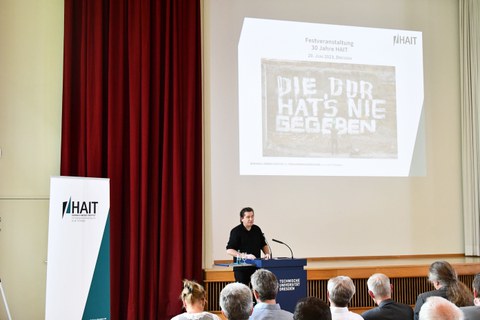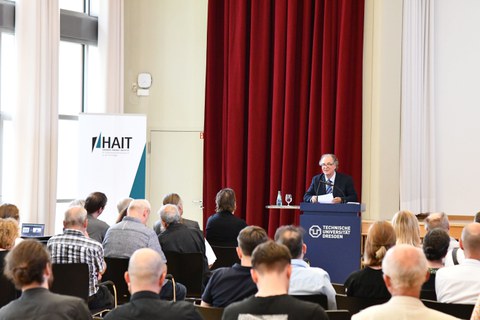Jul 13, 2023
30 years of the Hannah Arendt Institute for Totalitarianism Studies: “A driving force for contemporary and political science research”

The team of the Hannah Arendt Institute for Totalitarianism Studies (HAIT)
For 30 years, the Hannah Arendt Institute for Totalitarianism Studies (HAIT) has been researching the conditions leading to and the consequences of historical and contemporary totalitarian regimes as well as anti-democratic movements. During this time, HAIT has produced a significant amount of fundamental contributions to our understanding of National Socialism, the politics of the German Democratic Republic, and the period following the Peaceful Revolution of 1989, with a focus on political extremism. When the Institute was founded, the focus was on the contemporary history of Saxony. Since then, it's research has become more international, exploring the tri-border area of Germany, Czechia and Poland, but is also exploring transnational perspectives.
The significance and quality of the research conducted at HAIT was confirmed in 2019 by an evaluation carried out by the German Science and Humanities Council. In their evaluation, the internationally renowned experts ascertained that “the institute is a driving force for contemporary and political science research.” The results of their research are regularly presented at scientific events, ranging from lectures to conferences and film series, as well as in specialist publications.
Thanks to the comprehensive funding from the Saxon state budget, HAIT will be able to broaden its digital strategy and integrate digital humanities methods into its research program in the coming years. “For the development of a humanities institute, this is something akin to a quantum leap,” explained Prof. Thomas Lindenberger, Director of HAIT, in his speech at the event marking the 30th anniversary, which drew a large crowd to TU Dresden’s Dülferstrasse ballroom.
HAIT used the anniversary as an opportunity to explore issues of political relevance across the wide range of topics it deals with: To what extent are the past experiences of people in East Germany, but also in West Germany, with a successful revolution and the subsequent transformation integrated into the German state of mind as a whole? Why does political extremism - each in its own specific way - still infiltrate certain sections of German society? The Berlin historian Dr. Ilko-Sascha Kowalczuk explored these questions in his keynote speech, “The relevance of the past? The ever-new controversy surrounding the history of the GDR and communism in a unified Germany.”
Contact:
Maximilian Kreter
Public relations
Tel.: +49 351 463-36064
https://hait.tu-dresden.de/ext/?lang=en


